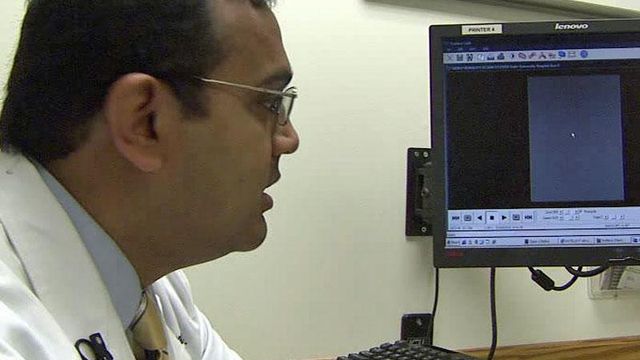Stem cell therapy may help circulation problems in legs
Stem cell therapy may help people with circulation problems in their legs. Duke researchers are testing the safety of injecting placental stem cells in patients with peripheral arterial disease, which may help them avoid amputation and stop leg pain.
Posted — UpdatedFor several of his 60 years, Ronald Davis has suffered a lot leg pain.
“I would get these cramps. I couldn't walk distances,” he said. “I was in 24-hour-a-day pain, seven days a week.”
Davis had peripheral arterial disease. Just like a blocked heart artery, he had blocked arteries in the legs.
“Till right about here in the mid thigh, there's a 100 percent occlusion,” said Duke Cardiologist Dr. Manesh Patel.
Even a surgical bypass failed, and Davis faced the possibility of amputation. Patel included Davis in a Phase 1 trial, which tested the safety of injecting stem cells in a solution called Pluristem into the leg where more blood flow is needed. The cells come from the blood of the placenta, the sac in which unborn babies grow.
“The placental cells are encouraging because we believe that they can differentiate into other types of bricks or cells that you need,” Patel said. “They may form the structure, the mortar of the new building and actual bricks, or they may actually call others to come and build that project.”
Patel says the process is proving to be safe, and with dramatic results in patients like Davis, as soon as three days after his treatment.
“And I realized … I could walk down steps normal. I wasn't in pain,” he said. “To this day, I haven't had to take another pain pill … and it looks like it's going to get better, I hope.”
The Phase 1 safety trial for stem cell treatments is still recruiting patients and for Phase 2 trials to test the effectiveness of the treatments. For more information call 919-668-8917.
• Credits
Copyright 2024 by Capitol Broadcasting Company. All rights reserved. This material may not be published, broadcast, rewritten or redistributed.





